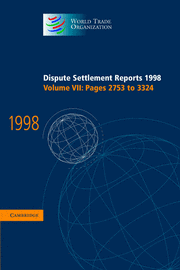United States - Import Prohibition of Certain Shrimp and Shrimp Products (WT/DS58): Report of the Appellate Body
Published online by Cambridge University Press: 22 December 2017
Summary
INTRODUCTION : STATEMENT OF THE APPEAL
This is an appeal by the United States from certain issues of law and legal interpretations in the Panel Report, United States - Import Prohibition of Certain Shrimp and Shrimp Products. Following a joint request for consultations by India, Malaysia, Pakistan and Thailand on 8 October 1996, Malaysia and Thailand requested in a communication dated 9 January 1997, and Pakistan asked in a communication dated 30 January 1997, that the Dispute Settlement Body (the “DSB”) establish a panel to examine their complaint regarding a prohibition imposed by the United States on the importation of certain shrimp and shrimp products by Section 609 of Public Law 101-162 (“Section 609”) and associated regulations and judicial rulings. On 25 February 1997, the DSB established two panels in accordance with these requests and agreed that these panels would be consolidated into a single Panel, pursuant to Article 9 of the Understanding on Rules and Procedures Governing the Settlement of Disputes (the “DSU”), with standard terms of reference. On 10 April 1997, the DSB established another panel with standard terms of reference in accordance with a request made by India in a communication dated 25 February 1997, and agreed that this third panel, too, would be merged into the earlier Panel established on 25 February 1997. The Report rendered by the consolidated Panel was circulated to the Members of the World Trade Organization (the “WTO”) on 15 May 1998.
The relevant factual and regulatory aspects of this dispute are set out in the Panel Report, in particular at paragraphs 2.1-2.16. Here, we outline the United States measure at stake before the Panel and in these appellate proceedings. The United States issued regulations in 1987 pursuant to the Endangered Species Act of 1973 requiring all United States shrimp trawl vessels to use approved Turtle Excluder Devices (“TEDs”) or tow-time restrictions in specified areas where there was a significant mortality of sea turtles in shrimp harvesting. These regulations, which became fully effective in 1990, were modified so as to require the use of approved TEDs at all times and in all areas where there is a likelihood that shrimp trawling will interact with sea turtles, with certain limited exceptions.
- Type
- Chapter
- Information
- Dispute Settlement Reports 1998 , pp. 2755 - 2820Publisher: Cambridge University PressPrint publication year: 2001
- 44
- Cited by



